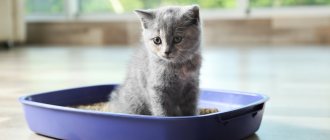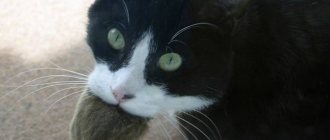Cats have long begun to become interior items, and not dangerous predators for all living creatures. However, quite often people get cats precisely to get rid of rodents, and only secondarily for pleasant company. Do you need to choose a specific breed for this, or can you raise a hunter yourself? This issue will be discussed in the article.
What breed of cat catches mice and rats?
The fame of outbred cats as the terror of rats and mice is well founded. After all, for them hunting is not just entertainment, but a way of survival. Healthy genes, not spoiled by close ties, ensure not only the transmission of hunting talent, but also physical endurance - a mandatory guarantee of victory over the enemy.
If we talk about purebred animals, then when discussing which breeds of cats catch mice, first of all we need to talk about the so-called aboriginal breeds. They naturally formed in a particular territory without the intervention of breeders, that is, they were bred by nature itself with all the ensuing advantages.
Among the “Russians” these are Siberian cats, Russian Blues, and Kuril Bobtails. Of those that have foreign roots, it is worth noting the giants Maine Coons, Orientals, Bengals, Abyssinians, Ocicats, Thais and Siamese, Chartreux, European and British Shorthairs - these cat breeds are also very, very deft at catching mice.
The role of living conditions
Living not in a private house, but in an apartment, a cat often catches mice for entertainment, not profit. Yard cats, or those who live in a private house, are better accustomed to hunting for food. These cats are more familiar with nature and the sight of a mouse will not cause them any confusion. Although, it is worth noting that instincts developed over centuries are not so easy to suppress, and over time, under certain conditions, even very domestic cats can become predators.
Still from the cartoon “Cinderella 2: Dreams Come True”
How not to harm a cat during castration?
In order for your pet to remain “full” even after castration, you must follow some rules when performing it.
Thus, all experienced veterinarians believe that castration of animals from seven years of age and older is permissible only in case of chronic and cancerous diseases of the reproductive organs. The problem is that when such pets are sterilized, there is a serious hormonal imbalance. This will not improve your pet's health. He may begin to have problems with excess weight, the cat will become apathetic, lethargic, and he will even stop catching mice. To prevent this from happening, it is advisable to sterilize older pets using medication. In this case, the level of hormones will decrease gradually, the animal’s body will have time to adapt to the changes taking place, and therefore serious consequences will be avoided.
It's easiest with kittens. They quickly recover from the operation, and hormones do not have such an effect on them (since they have not yet begun to be produced in the proper volume). It is for this reason that it is recommended to castrate animals at an early age. In this case, the procedure does not change their behavior in any way, and the cat will continue to hunt mice with the same enthusiasm.
Who is better at fighting rats on a farm - cats or dogs?
To answer this question we had to conduct a whole study
The enemy of my enemy is my friend. According to the proverb, dogs and cats - the natural enemies of rats - are the best friends of farmers.
Rodents cause many problems for agricultural producers: they not only spoil food and premises, but are also carriers of many dangerous diseases for both humans and domestic animals.
But who is more effective at eliminating rats - cats or dogs? Scientists from the Anglican University of Greenwich, the University of Swaziland in Africa and the University of Florida have teamed up to conduct research on this topic and offer farmers the best option for sustainable rodent control.
Researchers assessed rodent activity on 40 farms located in Swaziland, South Africa. The project involved 10 farms with only cats, 10 farms with only dogs, 10 farms without cats or dogs at all, and 10 farms with both animals. Scientists studied the number and activity of rats in each individual case.
It turned out that farms where either cats or dogs are kept are practically no different in rat activity from those farms where cats and dogs are not kept at all. But where cats and dogs live together, there are significantly fewer rats. Rodents prefer to avoid such farms.
“This was a completely unexpected result. We thought that cats would have the most significant impact on the rat population,” admits University of Florida professor Robert McClary. - But we were wrong. The fact is that rats are smart animals and can perfectly adapt to one type of predator, changing their behavior so as not to get caught in its teeth. But two predators are much more dangerous in this regard than one. It’s harder for rats to predict where trouble will come from, and they avoid such farms.”
Source
Tailed liberators of Leningrad
When all the cats in the besieged city were eaten in 1943, rats began to multiply at a catastrophic rate. They ran through the streets like a businessman in search of corpses, climbed into apartments, destroyed furniture and the last supplies.
The rodents were shot by special brigades and crushed by tanks, but the “rat troops” did not retreat. The city was saved by rat-catching cats of Russian and Siberian breeds. They were brought in trains from all over the country after the blockade was broken.
Today, two sculptures remind us of the four-legged liberators. One depicts the cat Vasilisa standing on the ledge, the second depicts the cat Elisha sitting opposite. St. Petersburg residents believe that whoever throws a coin on a cat pedestal will be lucky.
Recommendations
A hunting cat spends a lot of time outdoors, in contact with other animals, which increases the likelihood of infection and the development of diseases. To protect your pet from diseases, you need to remember the following rules:
- the cat must be periodically vaccinated against potential diseases;
- the pet needs to be fully fed and fortified with vitamin supplements, which will strengthen the immune system;
- every 5 months, clean your pet of worms for the purpose of prevention;
- the animal needs to buy a flea collar that prevents the spread of parasites;
- in early spring, before a walk, it is recommended to treat your pet’s fur with protective sprays, since in May the likelihood of insect attacks increases.
For preventative purposes, you can take your cat to the veterinarian for examination once every six months.
Sources
- https://animalsinfo.ru/%D0%BA%D0%BE%D1%88%D0%BA%D0%B0-%D0%B5%D1%81%D1%82-%D0%BC%D1%8B %D1%88%D0%B5%D0%B9-%D0%B2%D1%80%D0%B5%D0%B4%D0%BD%D0%BE-%D0%B8%D0%BB%D0%B8 -%D0%BF%D0%BE%D0%BB%D0%B5%D0%B7%D0%BD%D0%BE/
- https://xklop.ru/myshi-i-krysy/kakaya-poroda-koshek-luchshe-vsego-lovit-myshej.html
- https://apest.ru/myshi/vse-o-myshah/edyat-li-myshej-koshki/
- https://VashiKoshki.ru/porody/krysolov
- https://gafki.ru/koshki/krysolovy.html
- https://aquatech-spb.ru/koshki-porody/lovyat-li-koty-myshej.html
- https://www.zaggo.ru/article/vokrug_doma/obshee4/kak_izbavit_sya_ot_myshej_i_krys_8_porod_koshek_krysolovov_kotorye_najdut_i_obezvredyat_gryzunov.html
How does castration affect the hunting instinct?
Owners of apartments in urban high-rise buildings are not particularly concerned about the loss of hunting skills in their cat after sterilization. But for owners of private houses this topic is extremely relevant. How does the castration or sterilization procedure affect an animal’s ability to kill rodents?
The decision to neuter a cat will not greatly affect its hunting instincts. Cats before and after castration exterminate rats and mice in the territory entrusted to them with equal eagerness and skill. The exception is castrati who are overweight, which appears due to a sedentary lifestyle and too high-calorie diet. It is difficult for such pets to move, and their hunting skills are gradually reduced to zero.
Since the ability to hunt in cats is inherent at the level of instinct, it is difficult to influence it by sterilization. After the procedure, the animal may become less active and mobile, go out hunting less often, but this will not make the ability to track and catch a mouse disappear.
While cats often become fat and lazy after castration, spayed females, on the contrary, show more interest in hunting. Many cat owners claim that after their pet has become infertile, it goes hunting more often and brings its owners the trophies it catches. In addition, having lost interest in the opposite sex and not spending time and energy on bearing and feeding offspring, the cat directs all its energy to satisfying the hunting instinct.
In general, a tendency towards hunting and active games can be identified in an animal even in childhood. If, as a kitten, the pet is not distinguished by curiosity, nimbleness and activity, it is unlikely that in adulthood, especially after castration, it will be drawn to adventures. Typically, castrated cats become more obedient, calm and balanced.
Why does a cat find no interest in hunting?
From everything described above, we can conclude that only those cats who, by breed, are not too inclined to develop skills, who cannot do this due to physiological characteristics, or those who have enough entertainment and there is no need to get food. Most often, with proper attention and skill development, you can raise a hunter from almost any cat that you bring into your home. However, getting to know the characters and following the tips above will make this path much easier.
Have a purring day!
Character of Scottish Straight cats and cats
Scottish kittens are characterized by sedateness, independence and importance, at the same time they are active, inquisitive animals. They very quickly get used to a new place, among all the people living in the house
They immediately single out one person and unconditionally recognize him as a leader; a Scottish Straight cat will adore this person and follow on his heels. In the absence of people, he gets bored and always meets them at the doorstep, like a faithful dog.
With other family members, the Scots remain neutral and behave kindly; they are wary of strangers. They get along excellently with children, taking part in children's fun with pleasure. Kids, in turn, treat the charming teddy bears with delight and literally do not let go of the kitties.
However, parents should keep the situation under control, since straight-eared Scots cats cannot stand affection, squeezing, or being forced to be held in their arms, and when they break free, they can inadvertently scratch the child. They like much more to lie next to the owner, clinging to the person with their warm plush side. They rarely allow themselves to be petted and only when they want it.
Peace-loving, not at all touchy and unforgiving character, lack of aggressiveness make Scottish straight cats ideal companions for older people, and favorite pets for families with children (taking into account the points mentioned above about “cuddling”).
Straights easily find a common language with other animals living in the house: even with hamsters, even with dogs. They catch mice, and this “hunting” quality further increases the attractiveness of the breed.
Scottish Fold cats are not couch potatoes, unlike Persians, they are playful, but in moderation, they cannot be called too active, so you should not be afraid that in your absence they will cause disturbances in the house. They do not like heights and climbing curtains; exploring the wardrobes from above is not among their interests. Another thing is the inside of the closet, where a curious Scot will not hesitate to stick his charming nose.
Scottish Straight cats are not talkative; their meow can be heard extremely rarely, only if the animal is in pain or asks to be fed. More often they make peculiar sounds, reminiscent of creaking, or simply silently open their mouth.
Kittens quickly learn to use the toilet and scratching post. The last point is especially important, since straights have such a sin - they like to sharpen their claws on furniture or wallpaper.
Sphinxes
Sphynxes, like Scottish Folds, are by no means suitable for catching mice. This is due to many aspects of a cat's life.
- Firstly, everyone knows that sphinxes have no hair, they are completely naked. And for this reason, many owners, not only on the street, do not even leave their pets under the sofa, because it is easy for them to get injured or damage their skin by contracting some kind of infection.
- Secondly, nutrition plays a vital role in the life of the Sphinx. It should be balanced and healthy. Cats, by their very nature, want to eat a mouse, since it is fair-caught prey, but sphinxes are absolutely forbidden to eat such food. The mouse may be sick or old, and if you eat it, you can be poisoned.
- Thirdly, the cat's environment is also important for this breed. In cold weather, it is better for Sphynx cats not to sit on the floor, as they may catch a cold. And hunting involves long-term tracking of one’s prey and ambush. In warm weather, the Sphynx may get sunburned or simply feel ill from overheating.
Such cats are necessary for beauty and home comfort, and not for catching mice.
Find out why it is better for modern domestic cats not to hunt rodents and birds, as this can pose a danger to cats in the form of infections and injuries. How to wean a cat from hunting mice and birds?
Several species of rodents are known to carry hantavirus. Cats can be infected with hantavirus, but they do not show any symptoms, so the virus is not dangerous to them. Additionally, cats cannot transmit hantavirus to humans.
However, humans can be exposed through contact with infected rodents. 6 Although serious complications from hantavirus are rare in humans, exposure can lead to a serious illness called hantavirus pulmonary syndrome.
Have you dreamed of a cat and mouse together? Have you seen how a cat catches a mouse and, having caught it, kills it? Let's consider the interpretation from different dream books. Dreaming of cats and mice causes a feeling of anxiety.
Cats squabble, mice are welcome (proverb)
If there is already a cat living in the house, but it has not succeeded in catching rodents, the second pet should be of the opposite sex. One of the pets will have to be castrated, otherwise constant “weddings” are inevitable, knocking the hunter out of her “schedule”. There has been a lot of research into whether neutered cats catch mice. It has been proven that sexual desire only hinders a cat, and does not spur it on. A sterile cat, having forgotten about “partying”, devotes more time to games and hunting, and therefore is more successful. A castrated cat will not hunt less if he enjoyed this activity before the procedure. But if all his thoughts were occupied only with the search for partners, castration is unlikely to awaken in him a passion for hunting, although this also happens.
Two cats are the worst option: they will sort things out, forgetting about the mice that are getting bolder every day. Two cats can coexist peacefully if there is enough space and love in the house for both. Perhaps a more successful hunter will even become an example and be able to interest a lazier cat.
Relationship with the owner
A true Briton is smug and self-sufficient, and views his owners as breadwinners. It is not without reason that this breed is considered suitable for business people. They don't like to sit on their hands and can't stand noisy companies at all.
After a long day of work, the pet will greet the person reverently and tenderly, and will rub against the legs. They don’t like it when the owner stays late somewhere and doesn’t come home from work on time.
If there is a child in the family, you should not have a Briton for his entertainment. Representatives of this breed are very patient with children, but they will not allow themselves to be made into toys. They will hide and run away.
It is very rare for a straight-eared Briton to be “tame.” He doesn't often ask to be held and petted. However, when he needs to climb onto his owner’s lap, he will follow along until he achieves his goal.
Do dogs eat rats?
An interesting question becomes whether dogs eat rats. Some dogs are quite successful at catching and killing rats. However, do they eat such prey? In some cases, yes. Especially if these are stray, homeless animals trying to get food for themselves in this way.
However, giving a pet that has caught a rat the opportunity to eat it is not a good idea. After all, the rat could have previously swallowed poison and be a source of helminths or infections that can be transmitted to the dog and negatively affect its health.
To cope with a rat infestation, you should not have pets, but it would be more effective to contact a pest control company. Its specialists will carefully treat any premises and areas.
Recommendations
A hunting cat spends a lot of time outdoors, in contact with other animals, which increases the likelihood of infection and the development of diseases. To protect your pet from diseases, you need to remember the following rules:
the cat must be periodically vaccinated against potential diseases; the pet needs to be fully fed and fortified with vitamin supplements, which will strengthen the immune system; every 5 months, clean your pet of worms for the purpose of prevention; the animal needs to buy a flea collar that prevents the spread of parasites; in early spring, before a walk, it is recommended to treat your pet’s fur with protective sprays, since in May the likelihood of insect attacks increases.
For preventative purposes, you can take your cat to the veterinarian for examination once every six months.
How to care?
The grooming procedures that cats need include bathing, hygiene procedures and preventive veterinary examinations.
So, the cat should be washed as it gets dirty, but not less than once every 2 weeks (the timing may vary depending on the breed). In this case, it is allowed to use only those detergents that are intended for animals. Also included in the category of hygiene procedures is regular cleaning of the ears and eyes (this should be done with cotton swabs and pads).
Once every few months, the cat should be taken to the veterinarian. Do not forget to carry out systematic procedures to get rid of worms and fleas. If you notice that your rat catcher has been injured by a rodent, rush to the veterinary clinic, as rats and mice are carriers of a large number of dangerous diseases that can be transmitted to your pet, and even cause death.
In the next video you can watch how the cat deftly caught a mouse that ran into the house.
Cats and cats are different and perform a wide variety of functions. However, one of their key duties is to catch rodents. This question is especially relevant if a person lives in a private house. But you should choose your pet carefully. Not every breed is suitable for the role of a hunter, so not every cat will be able to cope with the responsibilities assigned to it.
Why does a cat bring prey to its owner?
Many cats bring their trophies to their owner, sometimes even to bed. There is no point in scolding them for this - this is how they express their love and affection. A corpse found on a pillow is not the most pleasant picture, but the pet that brought you the trophy still needs to be praised and rewarded. A negative reaction or lack thereof can discourage hunting.
Regardless of the breed of rat catcher you choose, be sure to vaccinate it against rabies. This will protect it from death if infected.
Do you like the article? 0
Cat or cat: who is the better hunter?
If we talk about the gender of mousecatchers, it still seems more reasonable to give the palm to the cat. In cats, the sexual instinct comes first, and if the animal is not castrated, the mustachioed cat can be distracted by “love” all year round, neglecting his hunting duties. We have all seen how skinny and tattered the tailed gentlemen return from their sexual adventures - it is obvious that they had no time for mice.
In cats, the estrus period is usually not long. And, raising kittens, as we said above, they hunt with double zeal and teach their offspring to do so. That is, they have double motivation. And female creatures usually have more persistence and diligence.
How to determine if a cat is a rat catcher?
Future owners of furry pets are often interested in which cats are better at catching mice. There is no specific breed that would be designed specifically for catching rodents. However, there are signs by which it can be determined that an animal is predisposed to this. In addition, there are more than one breed of cats that can catch mice and rats.
External signs that rat-catching cats should have:
- Large and dense build.
- Long, “L-shaped” tail.
- Short and wide legs.
- Powerful jaws with fangs.
- Long mustache.
- The head is shaped like a triangle.
- The ears are large, with possible tufts at the tips of the ears.
These are the most characteristic signs that allow you to understand that the kitten is a rat catcher. Once the external characteristics that rat-catching cats possess are known, it is worth considering the breeds.
Nutritional Features
Domestic cats often catch mice for fun, and successful hunting requires a lot of strength. You can feed your pet both natural food and commercial food. The main thing is that the food suits him, suppresses the feeling of hunger (but does not oversaturate him), provides the body with vitamins and minerals and strengthens the immune system.
Nutrition is important for successful hunting
Behavior change
There are often cases when cats behave quite aggressively towards household members and guests. Pets are capable of not only scratching furniture, but also attacking. The animal experiences a kind of stress (usually due to dissatisfaction). This behavior goes from episodic to permanent status, since the pet considers it the norm.
The problem can be solved if the animal is sterilized in a timely manner. The cat becomes more accommodating as the source of “indignation” ceases to be relevant
If even several months after the operation the cat still continues to be mischievous, then the cause should be sought in other factors (constant stress, illness, lack of attention, etc.). In the first days after the operation, the animal may behave too calmly
It will seem that in such a short period of time the pet's activity will decrease significantly. But actually it is not. The rehabilitation period for each individual is different. For some, a couple of days are enough to recover, while for others it takes up to several weeks or even months.
Kurilian Bobtail
The breeds of cats that are good rat catchers also include the Kurilian Bobtail. The bobtail cat first appeared in Russia in the 20th century, when it was brought from the Kuril Islands. These animals are distinguished by their loyal nature to humans. In some ways they even resemble dogs in character.
We suggest you read: Treatment of cows with scabies and lice
Kurilian bobtail kittens immediately become attached to a person and try in every possible way to protect him from all sorts of troubles. The latter include rodents. By the way, in addition to mice and rats, bobtails are capable of driving away small dogs that have encroached on their territory.
The breed is distinguished by a small tail, the maximum size of which is only 8 cm. In body structure, these animals resemble a lynx: they have long and powerful hind limbs, allowing them to make excellent jumps. Kurilian bobtails are capable of running at high speed and crushing mice and rats.
The weight of these animals is up to 6 kg in females and up to 10 kg in males. Whatever the hole is - a mouse or a rat, the Kurilian Bobtail can cope with it; it is not without reason that they are often found on farms and in houses where rodent pests predominate.
But, as in the case of fold ears and Maine Coons, bobtails of any breed, be it Japanese, American, or Kuril, are very expensive, and not everyone can have one. Moreover, he needs care appropriate to his breed.
The Kurilian Bobtail is good at catching rodents
Which cats catch mice and rats, heredity and upbringing
Let's look at which cats are better at catching mice. First of all, the success of the hunt depends on the color of the pet. If the color of the animal is black, gray, red, there are dim spots or stripes, then it will be much more convenient for him to hunt, it will be easier for him to merge with nature.
Domestic rat-catching cats catch mice because of the hunter's instinct, developed in them since childhood. All harmless games with a pet using “teasing” are actually preparing the pet to pursue and prey on its prey.
Homeless yard animals, just like domestic animals, follow their instincts. For them, hunting serves as a direct source of food and a way to survive.
There is an opinion that castrated cats are worse at catching mice and rats. Your pet's behavior can change greatly after sterilization. Because of this, many rural residents wonder whether a neutered cat will also deftly exterminate rodents or will it lazily sleep all day long.
Hypothetically, the hunting instinct should not be lost in the pets of rat catchers. However, in reality everything happens differently. If the rat catcher cat does not eat properly, it quickly gains weight, which causes laziness, apathy and leads to a slowdown in metabolism. It will be very difficult for the pet to hunt, so it may stop exterminating rodents. The rat catcher needs to be fed correctly after sterilization.
Owners of domestic cats believe that only domestic animals, which have been trained from childhood by their mother mousetrap to obtain food, can be rat catchers. However, this is not quite true. There are many purebred pet rat catchers who catch mice no worse than domestic ones.
Why do cats bring caught mice to their owners?
There are several reasons why pets catch mice: entertainment, food, defense of territory, caring for their offspring or owners.
The cat catches a rat, plays with it and releases it, or eats it. There are different scenarios for the development of events after a cat passes by its owners with a mouse in its teeth. No one could fully understand why the cat plays with the mouse.
Ratcatcher cats value their possessions very much, mark their territory and even protect it from uninvited guests. You can often hear the guttural sounds of cats preparing to attack an enemy who has entered their territory. Ratcatcher cats also protect the house from mice. Cats don’t need extra “guests”.
Many people do not understand why cats bring mice to kittens - they teach them to hunt and help them get additional food until they become independent hunters.
Some pets become very attached to the owner and therefore, if the pet brought its prey to him, then there may be several reasons for this - perhaps they want to feed their inept packmate, boast about their hunting skills, or thank the owner for his care.
Cats also bring their prey to the doorstep because they want to save their prey for later so that there is a supply of food in case the animal gets hungry. In any case, pets should not be punished. Praise the rat catcher, pet him, accept the gift and carefully throw it away.
Who is better at catching mice, a cat or a cat?
When purchasing a pet or taking an animal from the street, people often wonder who would be better at catching mice: an affectionate female or a willful male.
It is believed that female ratcatchers are better at hunting rodents. Maternal instinct by its nature pushes her to hunt. A cat with a rat in its teeth runs to feed its fragile cubs.
Cats also catch rodents, but their main activity is searching, capturing and fertilizing a suitable female for procreation. Therefore, cats hunt less than females. They are able to hunt not only rodents, but can also cope with other pests (moles, snakes, birds). It follows from this that it is best for owners of private houses to have female rat catchers.
The importance of a pet's appearance
Appearance is very important when choosing a hunter cat. First, pay attention to the color of the coat - it should serve as camouflage. For example, discreet colors are suitable for our nature - gray, brown or variegated. Also, not only the color, but also the length of the coat plays an important role: too long can interfere with hunting. In addition, when wet, its strong odor can scare away potential victims. And, of course, the mustache is the natural locator of your home hunter. With their help, the animal navigates in the dark, catches air vibrations and estimates the distance to prey. And therefore the rule “more is better” works here.
Predator on the hunt
Main breeds of rat catchers
Independent hunters are representatives of the Russian Blue breed. They become attached to only one owner, whom they are ready to protect from rodents. Athletic athletes - Chartreux cats - have a beautiful athletic physique, which helps in catching rats and mice.
Maine Coon
This ratcatcher cat is the largest breed; it is an intelligent and selective animal - a good hunter. The Maine Coon reacts with lightning speed to a rodent, and its powerful body and dexterous movements leave no chance for rats and mice. At the same time, he is a sweet and gentle creature who will purr with pleasure in his owner’s ear.
Siberian
The Siberian cat rarely becomes attached to humans, perhaps it has the “wild” blood of its ancestors. This balanced and powerful animal is considered the best rat hunter. Freedom is very important for an obstinate pet; the cat wants to walk outside from time to time. The Siberian cat is capable of developing great speed in running and jumping well. In addition, the animal has an excellent reaction.
European
The cat was common in ancient Rome. She copes well with the duties of a rat catcher. Each representative of this breed is an individual. The animal has a silver marbled or gray color.
Kurilian Bobtail
The animal was brought to us from the Kuril Islands. By their nature, the fluffies of this breed are similar to dogs. The little kitten quickly becomes attached to its owner and tries to take care of him.
The Kurilian Bobtail has a small tail. The cat has elongated and powerful hind limbs, which allow him to jump and develop great speed while running. The Bobtail can cope with any rat's home.
Siamese
Humans have nothing to do with the breeding of this breed. Siamese cats are fast and graceful. They have a very well developed hunting instinct.
Dawns, weasels and khanoriki - specialists in mouse catching
In addition, they are rightfully considered “mouse specialists”
- ferrets,
- caresses
A cross between a ferret and a mink, which many people keep as pets. True, these animals had one significant drawback - in addition to mice, they happily hunted poultry.
Therefore, although ferrets can be considered unsurpassed mouse hunters and clear the household of them, they are rarely used in this capacity. The same function was performed by mongooses, which are excellent at hunting not only snakes, but also rodents.
Pied Piper Cat Breeds
The best mousecatchers are native cat breeds that appeared naturally and have not undergone significant transformation. Compared to artificially bred ones, hunting skills in such breeds have been developed over centuries, which has given the corresponding result.
Russian blue
Russian blue
Due to its compact size and aristocratic appearance, village house owners doubt the hunting skills of the Russian Blue cat. The lack of heavy weight is compensated by a quick reaction and the ability to move quietly around the yard. The Russian Blue cat tracks rodents of any size, which serves as the main entertainment for the pet.
Siberian
Siberian
The skill of catching mice among Siberians has been confirmed by more than one generation. The pet is large in size and has thick fur, which allows it to pursue prey in any weather conditions, moving silently. The role of sound insulation is performed by fluffy pads on the paws. Siberian cats move in jerks and make long jumps, which allows them to cope with the prey.
Since Siberians are not attached to their owner and home, pets spend most of their time outside, ambushing rodents. When the Siberian cat is busy tracking down prey, it ignores the call of a person and the feeling of hunger, plunging into the hunt. It is recommended to get a breed for people living in the northern regions.
They are trying to feed you and teach you
The cat takes its owner for some semblance of itself. She sees that for some reason her owner does not catch mice, and decides to do this work for him. They say, if he cannot hunt (perhaps due to health reasons or lack of skills), then I am ready to help.
Sometimes a cat, to the horror of the female part of the family, brings a mouse, slightly strangled, but still alive, and proudly presents it. This is a kind of training: she wants you to practice the art of catching rodents with an inactive prey.











